News topics
Monthly Newsletters
// //// //// Online Booking //
// //// // // // // // //
For group bookings please contact
017687 77246 or
contact@derwentwater.org
Keswick to Barrow Walk Group, May 2019.
Hostel developments
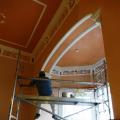
This winter has seen decorating taking place at the hostel on an epic scale! Some of you may not have seen our grand Room 1. It has a beautiful ornate plasterwork ceiling but as its 18’ high and a huge area, we booked the professional painters to tackle this job and a few of the other rooms with high ceilings. Painting the cornice with all the intricate mouldings, has been a labour of love and we are delighted with the finished result. Congratulations to Bells Painters for doing a fantastic job for us. Room 1 was the drawing room, where Joseph Pocklington entertained his guests when the house was first built in the 1780’s. Please ask when you’re at the hostel, if you’d like to view the room as it’s well worth seeing.
Staff, hostel volunteers and the Community Payback Scheme, have tackled some smaller bedrooms and washrooms. In our 25 years at Barrow House, this is definitely the most redecorating to be achieved in one winter. Many areas now have Georgian colour schemes which we feel really enhance the house. We hope you’ll like all the redecoration as much as we do and will welcome your feedback.
January 2014.
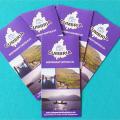
There are now 257 independent hostels throughout England and Wales who are all part of Independent Hostels UK (IHUK) and appear all together in the Independent Hostel Guide and on the IHUK website.
This network of Independent hostels is increasingly filling the gap left by YHA by providing affordable accommodation in places of interest, for young and old alike. Derwentwater Youth Hostel is just one of the many hostels which have survived and prospered under private ownership, despite being sold by YHA because they were considered to need too much investment to be viable or profitable businesses.
There is now a substantial group of independent hostels (plus camping barns and bunkhouses) in Cumbria which means that there is all sorts of potential for linking the hostels for a walking or cycling holiday. Being a link in a chain of successful hostels gives more scope for our visitors wanting to explore different areas of Cumbria in one trip. And because each hostel is owned and run independently, there is the sense of individuality and uniqueness which makes visiting each hostel a surprise and a pleasure.
Derwentwater Youth Hostel is featured in a colourful new leaflet produced by IHUK promoting nine of the independent hostels in Cumbria. The new leaflet shows the stunning locations and diverse and interesting buildings that these nine hostels occupy - from our 220 year-old Georgian mansion to the converted Methodist Chapel at Kirkby Stephen. We would never have been able to fund a publicity tool like this independently, so we are really pleased to be included in the leaflet which really enhances and compliments our own marketing efforts.
Being part of this Cumbrian Hostel group, which in turn is part of the IHUK network, is exciting and really creates a sense of belonging. There is close contact with the other hostels and there are plans for monthly meetings and get-togethers to share ideas and happenings. Although independent businesses, we are working together, which is a really positive move for staff and guests alike.
So if you were thinking that with all the recent YHA closures that a hostel-to-hostel trip was going to be impossible, think again! We have copies of the free Cumbrian Independent Hostels leaflet at the hostel, and you can buy the Independent Hostel Guide at our reception. These will give you all the details you need to organise your holiday, or else you can look on the IHUK website. But do make sure you include a stay here at Derwentwater Youth Hostel!
May 2013.

Two years ago (yes, really, it is that long already) the hostel went from being part of a major national and international organisation to becoming a small, independent business with charitable status, but we retained the name the hostel had used during the YHA years.
But now we think the time has come for a new name which reflects more accurately who we are. We are incredibly proud of being an independent hostel and so, without much more ado, we give you: Derwentwater Independent Hostel!
Becoming an independent hostel has given us so much more freedom and scope to explore opportunities we just didn’t have previously. One of the most important changes is that it has enabled us to become more involved in the local community, working closely with other local businesses and suppliers to forge real partnerships, using local suppliers and encouraging locals to enjoy the hostel grounds. Whereas before the grounds were gated off, locals and visitors are invited to take the walk down from Ashness Bridge through the hostel’s grounds, past our stunning waterfall, and pop in for tea and homemade cake – and maybe see a red squirrel along the way! We work with several local adventure and activity providers so that we can offer groups and families an all-inclusive package. And instead of a having to use big national catering supplier we source all our food and beverage from companies based just a few miles from Keswick.
With independent status, we have had the freedom to be able to work on exciting new initiatives, such as an innovative new educational development which will offer an all-round package for schools and other educational establishments, and which has immense scope for teachers and pupils alike. The hostel will also be shortly launching their new website which will reflect the new branding and provide even greater depth of information and ease of navigation than the current site.
And now that we are part of the ever-increasing Independent Hostel UK (IHUK) network it means friendly support from other hostels in the Lakes and marketing support via IHUK’s website and handbook.
Kathy says 'Initially we were, in all honesty, very daunted at being independent but it’s been so brilliant and liberating. I think it is significant changing our name to Derwentwater Independent Hostel – we are very proud now of being independent. I really think that other people see us differently and are more supportive and helpful.'
The owner of our hostel, John Snyder, says, 'I am immensely proud of the Derwentwater Independent Hostel team. The first two years of any new endeavour is the hardest part. Our team started with no advance bookings, and have beaten their forecasts each year making a small surplus which we can channel back into the hostel as a not-for-profit charity. The evidence of their hard work is that we can continue past that all important two-year milestone!'
November 2013.
Our history box contains a miniature photo book from the period in which Robert Graham ran Barrow House as a guest house: c.1943 to 1961. This month we had a visit from someone who has a copy of the photo book in her family: it would be lovely to hear from anyone else who has a copy.
Produced by the professional photographers and keen rock climbers George and Ashley Abraham (G.P Abraham Ltd was their company name) of Keswick, the booklet contains ten black and white photographs of Barrow House and its environs, as well as an area map on the last page. The photographs include a close-up of Barrow Cascade, a view of Skiddaw from Ashness Bridge, and a portrait of Barrow House. Please ask if you'd like to see the photo book.
We are planning to make a modern-day photo book of the same scenes and we would love to have your input for the Barrow House portrait. Do you have a photograph of Barrow House that you are particularly proud of? If you would like the chance for your photo to be included please email it to contact@derwentwater.org. Please include your name and the date of the photograph (month and year will do).
We look forward to gazing admiringly at photographs of our hostel!

Welcome to our new website www.derwentwater.org.
We were very fond of our previous site, built so quickly by school boy Sam Snyder in 2011, but Sam has now surpassed himself by coding a more advanced site and building a content management system, allowing us to change the content independently. Sam is only 17 but his knowledge and skills extend far beyond A Level Computer Studies!
A brief look at the new things on our website:
- An online booking system. Groups still need to contact us directly though.
- Pages about our history, the grounds, our charity, and things to do in the local area.
- 360u00ba Education + Adventure. This section provides information and ideas for school, university and youth groups.
The development of the new website has been a great team effort. There were many contributions by hostel staff, volunteers, and trustees, and Lisa Bamford, a great designer at Stoats and Weasels, helped to refine and guide our ideas, producing the final design for Sam to code. We are also really grateful to Rebecca Laff, Geoff Williams, Laura Zill, the Snyder family, Fiona McCarthy, Katy Moore, Kathy Morris, Dave Piercy, and Keswick Tourism Association for their fantastic photographs. Thank you to everyone involved.
With our whizzy new content management system we can edit things very easily, so please let us know if you have any particular requests for the site. We definitely welcome feedback. In the meantime, we hope you enjoy exploring the new site.
March 2014.
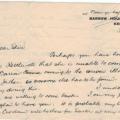
In the late 1920s and early 1930s the resident proprietor at Barrow House was Mr Joseph Glaiyser, who ran the house as a guest house and youth hostel during the summer months. Now, thanks to a visit from Judith Vincent (nee Stanley), the daughter of one of the parlour maids, we have copies of some of the letters, photographs, and documents from that time.
Elsie Stanley (nee Corbett), the young parlour maid who started working at Barrow House at about the age of 20, was born and brought up near Newcastle, but Keswick gradually became the centre of her life, meeting her future husband William Stanley at the Keswick Convention, and raising Judith and her sister Margaret in the town. In fact, William was a local Keswick boy who worked for the joiners company that we use today (F&W Green) and the work bench that he used is still going strong!
Judith moved away from Keswick in 1969, but she is still a Keswick Reminder subscriber and when she saw an article about us earlier this year she got in touch. We then had a wonderful visit from Judith and her husband during half-term, providing us with more information about Elsie, Joseph Glaiyser, and the running of the house.
Judith showed us some of the correspondence between Joseph Glaiyser and Elsie, and a record of the parlour maid duties, some of which are similar to our tasks today. She also had a copy of a Barrow House pamphlet, advertising its facilities as a youth hostel. This clearly states, in capital letters, ‘No intoxicants’!
We have transcribed the material and scanned the photographs, and they are available to look at here and on the History page of our website.
October 2015.
At the beginning of October, as we were sitting in the sunshine at High Lodore Farm cafe, I recalled a poem that I’d seen last year: October Day by Edwin Morgan. Later on I looked it up and realised that it was National Poetry Day: there was definitely something poetic in the air! Here it is:
October Day
Get the sun out, get it shining
It’s only October and only a tenth of the leaves are yellowing
Prod a few white clouds out of their beds and get them billowing
We can sit a while and not batten down the hatches for a gale following
We can clink a glass and swirl the wine and still not rush the swallowing
We can sit in a moodless clear afternoon until the late light spreads it hallowing over everything
And then we must bring the day to rest with ease, recollections, far thoughts, love, and dallying
Inspired by this poem, we decided to make a self-led poetry activity for October half term, loosely based on the theme of an October day in the Lake District. We invited everyone to write a poem (with some guidance notes available for writing different types of poetry), which they could then tie between laminated leaf flaps and hang on a tree in the grounds, ready for others to find. We were delighted with the results! This can actually be an ongoing activity, with a shift in the theme to match each month, so please feel free to contribute or ask for guidance on writing different types of poetry.
October 2015.
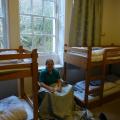
We are in a sound financial position, following a healthy couple of years, and so thank you to all the staff, guests, visitors, and volunteers who have contributed to our success. We are using our surplus to make considerable improvements to the hostel, including a fund for subsidising educational residentials, and we hope you enjoy their benefits. Here is a summary:
- Bell, the professional local painters, have painted the dining room and front entrance in Georgian-style colours. They have also painted some of the corridors, and all of the first floor doors and woodwork. Staff and volunteers have also done lots of painting.
- The central heating has been extended to Rooms 2, 3 and 4, the first floor corridor, and the first floor shower area. Guests can now adjust the radiator temperatures: a great improvement.
- Room 12 has had a fabulous make-over, with tanking and plaster boarding by Billy Edmondson. Billy worked so hard and so cheerfully.
- Nicola has made several new curtains, with fabulous material from Textures, a Keswick shop. The new curtains in Room 1 are going to look particularly impressive.
- Volunteers Kinga Anheuer, Alex Scott, and Ted Ferguson worked very hard in the grounds, transforming the area by the veteran yew tree and the fenced garden.
- We have created a DIH Fund for subsidising school and youth group residentials, with awards of up to 1000 pounds per group. This is open to groups from any area, but there is a simple application form to assess need. Please spread the word if you know of a school or youth group who might be able to benefit.
December 2015.
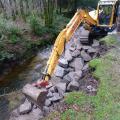
As you may have seen on the news, or experienced yourself, the rain and wind which came in December caused a lot of damage in Cumbria and further afield. Luckily nobody at the hostel was hurt, and the house is dry and intact, but sections of the river bank in our grounds collapsed, causing damage to our service pipes. Thank you to everybody who has been so understanding and supportive, and we hope you are not severely affected by the storms that have ravaged so many other areas in the past month.
Here is a summary of how Storm Desmond affected the hostel:
On Saturday 5th December water started coming into the managers' house, but the hostel staff and volunteers were brilliant, moving all the furniture and belongings upstairs. Luckily there was not too much damage.
Nicola and volunteer Alex Scott (Scottie) cycled through the floods to get to and from work, but the road was impassable on Sunday 6th December and so they helped out at Keswick Hostel instead.
Water was pouring down the fell sides, bringing rocks and vegetation with it. The driveway was like a river! The lake rose over the Borrowdale Road, with waves lapping at the driveway.
The banks of Barrow Beck collapsed, taking away a section of the footpath that runs behind the dining room.
The Penstock pipe, which transports water from the dam to the hydro-turbine shed was ripped away.
Our water supply pipe, which runs through the banks of the beck, was damaged. We realised this when the mains water supply was restored to Borrowdale (having been damaged), but nothing appeared for us! Luckily our plumbers (Keswick Plumbing) and builder (Billy Edmondson) went beyond the call of duty, repairing our water supply pipe very quickly.
Our main sewage pipe was also damaged, putting most of our toilets and showers out of use. This is one of the reasons that we had to close to guests.
The insurers and loss adjuster reacted very quickly to appoint a structural engineer from a Kendal company R G Parkins, who then appointed Maryport contractors Thomas Armstrong to undertake the repair job. The contractors worked really hard, all the way into Christmas Eve afternoon, to shore up the banks of the beck, moving 40 000 pounds worth of rock armour into the channel by the hostel. Hostel staff watched in amazement at the skill of the digger drivers as they manoeuvred the giant boulders into place. This has prevented damage to the house foundations.
The hostel had to cancel bookings for December and January. We were very sad to disappoint so many families and groups, but the job was made much easier by everybody's understanding.
Our staff have been very positive and helpful, but it feels odd when we don’t have guests. We were looking forward to a jolly period of work in December and January, with bookings for pre-Christmas and New Year parties, but we have been keeping busy with maintenance jobs instead, and the hostel will look very shiny and clean when we re-open.
There have obviously been detrimental effects for our suppliers, and other local businesses, but we hope to be open as soon as possible, and the community spirit in Cumbria has been wonderful to see.
December 2015
Nicola, our senior assistant, has recorded some of her experiences of Storm Desmond. Please get in touch if you would like a copy of the longer version and some of her tips for cycling through deep puddles...
I hadn’t anticipated how extreme the weather on Saturday 5th December 2015 was going to be. I’d heard the flood warnings, but I hadn’t been able to picture what was to come.
I woke up to torrential rain, but that was not unusual. However, later in the morning the lake started to flow across the road, and new rivers of water tore down the driveway. I decided to ring the guests who had booked for the weekend to tell them not to come.
I was just about to ring Alex Scott (Scottie), our current volunteer from Australia, when he appeared at the hostel. He had cycled through huge swathes of water on the Borrowdale Road, but he was incredibly cheerful: amazing! Later that day we cycled back to Keswick together, and although it was a bit scary it was definitely safer than driving. As we got towards the town centre, we realised that the road had been closed, but some cars were still driving past the barrier. However, I did at least manage to stop one non-local driver, who was planning to follow his sat-nav over Honister Pass to avoid the A66 road closure: I recommended he find accommodation in Keswick instead!
After going home and changing out of one set of waterproofs into another, I set off to have a look around Keswick. It was soon apparent that this was at least as bad as 2009. A family I know were evacuating their property opposite Booths, and fire engines were pumping water from Penrith Road back into the River Greta. Mountain Rescue and Police Community Support Officers were everywhere.
Then I set off to Keswick Hostel, which is right next to the River Greta. I know some of the staff there, so I wanted to see if they needed any help. The river was already over the main walkway, so I went round to the back entrance and helped move things to the upstairs of the staff house.
Next day, after a long night of whistling wind and hammering rain, I went to check that Scottie was ok, and then we both went back to Keswick Hostel to check on them. The water had risen to about a foot in the night, and they were sweeping mud and water out into the river, which was still running over the walkway and right past the hostel entrance. Even at this point it was obvious that the walkway would need to be rebuilt. We stayed for a couple of hours, helping with the clean-up.
Scottie and I finally made it back to Barrow House on the Monday morning: it was actually quite a bright, dry day. The hostel itself seemed fine, but then we went round the side to inspect Barrow Beck, and I was shocked to see the gap where our footpath used to be, and how deep and wide the channel had become.
The resilience and good spirits of everyone who has helped in the recovery process has been fantastic. Thank you for your messages of support, and please come and see us soon!
December 2015.
Staff member Pez Bullen recalls his experience of Storm Desmond...
Looking out of the self-catering kitchen window at ‘daybreak’, I saw that the lake had already risen well into the field across the road: a good indicator of particularly heavy rain. However, this was just the starting point…
As forecast, the rain was torrential, and our waterfall was looking impressive. The more water tumbling over a waterfall, the better - surely it can only get more spectacular?
The morning passed by. A gale flung the rain at the hostel and the driveway turned into a stream. Internet updates told of roads becoming impassable, and we cancelled our guests, trying to catch them before the road closures. We few staff went on with our work, but it was difficult to concentrate.
Around lunchtime I togged up for a quick taste of the weather. The gale blew, the rain lashed down, and the light was gloomy. It was an all-day twilight. The driveway stream was in good flow. Not only was water pouring down, it was taking an abundance of debris with it. Very impressive. And not normal.
As for the impressive waterfall, it had gone beyond spectacular. The beautiful white cascading waters were now a seething, roaring torrent of rage. The ferocity of the waterfall, and the headlong rush of an enormous body of foaming brown water, was simply not natural. It truly felt like a disaster movie. Impressive and spectacular had become a little frightening.
The dismal mid-afternoon light was fading fast when I was called to the dining room. The footpath by the waterfall had become a fast-flowing stream, but the ‘sight’ was of the ground beyond the path slipping away before our eyes, into the gorge below. The beck was eroding its flank…and coming our way! Personally, I couldn’t sit there and watch the horror unfold, but reports came through periodically, such as ‘that tree’s gone now’ and ‘there goes the fence’. Where would it all end? With the side of the hostel collapsing into the beck below?!
Darkness spared us further visual horror. We huddled together in front of the fire, listening to the wind and the rain, and wondering what we would wake up to. But sleep was difficult, with the imagination stimulated by the thundering, tremoring waterfall.
A new daybreak. Storm had checked out early. The rain had stopped, the torrent had eased considerably, and the building was still standing. However, the path by the waterfall was now a cliff edge: at its narrowest point there was only a metre between the hostel and complete ruin!
The raging waters have now been replaced by a new spectacle: tonnes of boulders and 3 dextrous diggers. Our beck and foundations have been saved!
December 2015
Thanks to our hardworking contractors, who've been looking after us since the December storms, you can now walk along the side of the hostel again, admire the babbling beck, and relax in the dining room without fear of collapsing into the channel below.
This photo shows the three main workers by the new stone wall, taking pride in completing their huge task.
The first phase of emergency repairs took place in December and January, with huge boulders to shore up the banks of the beck. The second phase was completed at the end of June, after 9 weeks of stabilising the channel bed and sides, and restoring the beckside path and fencing.
Louie (aka Colin) is the champion digger driver who placed all the rock armour with such precision in the beck. He reckons it is a 5 metre drop from the top of the bank to the bottom of the beck! He used 1000 tons of rock, with 100 cubic metres of concrete being pumped into the walls.
Jonathan is the waller who rebuilt the wall beautifully on the opposite side of the bank.
They enjoyed working here and have done a splendid job making a base to the beck and rebuilding the walls to make the hostel safe from any future storm/flood damage. It was great to see how much pride they took in the work, and we wish them the best in their next task.
June 2016
.png)
So long, farewell and thanks for 27 wonderful years ….
We’ve been incredibly fortunate to have worked at the hostel since 1988. The years have simply flown by, although when we remember our early days here we realise that hostel work has changed a lot – no emails, internet or mobile phones in those days.
Barrow House became a youth hostel in 1961 and it’s interesting to note that there have only been three sets of wardens/managers in that time. Other hostels have seen a much bigger turnover but, as many of you know, Barrow House is a very special place: why would we want to move on?
However, with big birthdays looming this summer, it’s high time we handed over to the next generation of hostel managers. The photo shows we really have been here a long time – it was taken a mere 22 years ago!
It’s been a privilege working here for so long and we should like to say a huge thank you to John and Sarah Snyder and the trustees, who secured the future of the hostel when it was sold by YHA in 2011.
We also want to say a big thank you to the fantastic staff and volunteers who have worked here and contributed so much to the success of the hostel, as well as all our local tradesmen. Lastly, a big thank you to our loyal groups and great guests who have made our job such a pleasure.
We handover to Tim Butcher & Aukje Noorman on 1 August 2016 and wish them and their family a very happy time here at the hostel.

At the end of October, on a mild, dry, and very calm night, we started a bonfire, working our way through piles of vegetation and old fencing, accumulated from the Storm Desmond clean-up and a summer of rhododendron clearance.
Pez in particular has done a fantastic amount of gardening this year, opening up the view of the waterfall from the rear of the hostel, and clearing lots of rhododendrons from around the fine Irish yews.
We really enjoyed gathering around the bonfire, toasting marshmallows, and there will probably be a few more this year - plenty of stuff to get through!
October 2016.
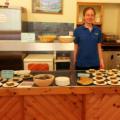
The Barrow House Coffee and Apple Cake has been very successful this autumn, with particularly good bakes by Lucia, our German volunteer. It certainly went down well with the folk who came on the National Trust guided walks in October: one lady even declared, 'that's the best cake I've ever tasted in my life!' Here's the recipe:
Makes 24 pieces in a 40cm x 26cm rectangular tin. Oven temp: 375 F or 190 C or Gas 5.
175g sultanas
2 tablespoons dry instant coffee
250ml water
180g butter
2 teaspoons vanilla essence
450g brown sugar
2 eggs
500g self raising flour
1 teaspoon cinnamon
1 teaspoon bicarbonate of soda
2 apples, grated
Caramel icing
6 tablespoons brown sugar
90g butter
3 tablespoons milk
400g icing sugar
1. Combine sultanas, coffee and water in saucepan.
2. Bring to boil, remove from heat, cool to room temperature.
3. Cream butter, vanilla essence and sugar together until light and fluffy.
4. Beat in the eggs, until smooth.
5. Stir in half the flour, cinnamon and soda with half the sultana mixture.
6. Stir in the remaining flour and sultana mixtures.
7. Stir in the grated apple.
8. Spread mixture in greased tin.
9. Bake at 375 F for about 25 minutes. Allow to cool.
Caramel Icing
1. Combine brown sugar, butter, and milk in a saucepan.
2. Stir constantly over heat, without boiling, until smooth.
3. Gradually stir in sifted icing sugar.
4. Spread quickly over the cake.
October 2016.
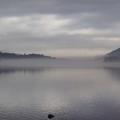
There have been lots of exciting deliveries this winter - so many cardboard boxes! The contents include a data projector, a wall-mounted flat screen TV, new bedding, a 7ft Christmas tree, a log store (well-built by Pez and Ian), and shiny new laundry baskets... Tim and Nicola also hauled 35 new mattresses around the hostel - we hope they help you to sleep well! We are also introducing a few new items on the menu, and in the next few months the servery and reception area will be refurbished.There have been lots of exciting deliveries this winter - so many cardboard boxes! The contents include a data projector, a wall-mounted flat screen TV, new bedding, a 7ft Christmas tree, a log store (well-built by Pez and Ian), and shiny new laundry baskets... Tim and Nicola also hauled 35 new mattresses around the hostel - we hope they help you to sleep well! We are also introducing a few new items on the menu, and in the next few months the servery and reception area will be refurbished.
February 2017.

We are very happy to announce that Cumbria County Council will now collect plastic from the hostel, in addition to glass, paper/card, and aluminium. All recyclable materials can go in together, apart from paper/card.
We have put new recycling bins around the hostel, and re-labelled the ones in the courtyard, and so we hope you will make the most of them. Please make sure everything is washed out first though!
May 2017.

According to the British Bryological Society's "Mosses and Liverworts of Britain and Ireland: A field guide", T. tamariscinum is among the most distinctive of the British mosses (so hopefully I've succeeded in the terrifying task of trying to identify it correctly - fingers crossed). The guide says "[It] grows on soil in woodland, in hedge banks on clay and amongst grass in damp places." The very attractive fern-like shoots can be easily seen from the path alongside the waterfall behind the hostel.
(Thank you Alex.) May 2017

Some of you may know that we used to offer tea and cake before Storm Desmond (Dec 2015). We really enjoyed meeting local people, walkers, and cyclists, and we are delighted to be open again for simple refreshments, every day from 12 to 4.30pm (except for times when we have sole-use groups).
You can sit in the dining room and watch the bird and squirrel feeders, get cosy in the lounge, relax on the terrace and look out at Derwent Water and Skiddaw, run around on the grass, or try the orienteering course.
A pot of tea or coffee is u00a31.50, and we have a small selection of crisps, confectionary, soft drinks, ice cream, beer, wine and cider.
May 2017.
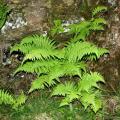
Near the top of our waterfall path, just upstream of the weir on the left hand bank (if you are facing upstream), there is a small patch of Oreopteris limbosperma, also known as Lemon-scented or Mountain Fern. These ferns like moist, acidic, shady woods and stream banks.
When the glands on the lower surface are brushed, you get a lovely lemon scent. Not advised for flavouring the lemon buns though!
Here are some more photos of Oreopteris limbosperma in Cumbria and beyond: http://www.ferns.rogergolding.
Thank you to Roger Golding and Alex for sharing their knowledge of ferns with me.
September 2017.

Book before 31st October 2017 to stay with us during November, December, January and February and receive 40% off dorm beds and private rooms. This reduces dorm beds to u00a312.60 and, for example, a Four-bed Family Room to u00a343.20. Book soon, as we think this offer will be popular!
Bookings must be made online at www.derwentwater.org, using the promo code Winter40.
This offer is being sent to all of our newsletter subscribers as a ‘Loyalty Reward’, but please feel free to share it with family and friends as we are keen for more people to try us for the first time. The fire will be roaring in the lounge, and our usual Barrow House welcome awaits both new and familiar faces.
The hostel is open every Friday and Saturday night during the winter, and from 28th December to 6th January for the New Year Holiday. We’ve also got plenty of availability for February Half Term weeks (9th to 24th February 2018).
We look forward to seeing you all soon.
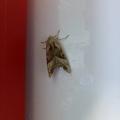
Moth studies, by Alex Helliwell (Hostel assistant)
Between May 2016 and May 2017 I made a hobby of identifying the various species of moth that found their way into the hostel each night. Over the course of the year I managed to identify 115 different species of moth which had been attracted by lights in the hostel, mainly around one of the shower blocks where the window is often left open as it gets quite humid. Last Summer I also attended a few events held by the Cumbria branch of Butterfly Conservation, an organisation dedicated to protecting butterflies, moths and their habitats. The guided walks around various Cumbrian nature reserves were really interesting and I saw lots of fascinating plants and wildlife, whilst learning how the reserves are managed to benefit rare species. I met a few people working for Butterfly Conservation, including Martin Tordoff who kindly arranged the loan of a Skinner Moth Trap for the hostel this year when he heard about my interest.
As expected, the moth trap is far more compact and portable than the shower block we've previously been using to lure them in - it comprises a simple wooden box with clear plastic panels angled downward towards an opening in the centre beneath a very bright light bulb. The moths are attracted by the light and while it is easy for them to enter the box, it is more difficult for them to escape. The wooden box is also filled with old cardboard egg boxes to provide dark recesses for the moths to retreat to once they're captured. We don't turn the light on every night, but at least once a week, and the moths are released after they've been identified. I count and identify them early in the morning, before work, and so far the maximum number found in the trap has been 14, with Yellow Horned and Oak Beauty being the most abundant.
Moths are a crucial component of the ecosystems they dwell in, being important both as pollinators for plants and as food for other animals, such as birds and bats. Studies have shown that the total abundance of moths in Britain has decreased over the last 40 years. Many species are in decline, which is likely to be due largely to habitat loss caused by human activity, though pollution and climate change are also playing a part. Monitoring moth populations allows us to directly observe the human impacts on this portion of Britain's biodiversity over time, as well as allowing us to determine which species are under particular threat and need to be protected. All records of species caught by the trap at the hostel will be sent to Cumbria Biodiversity Data Centre. Apparently there are relatively few people studying moths in the Central Lakes area so hopefully our records will be useful.
We'll keep you updated with our findings throughout the year, and you might also find these links interesting:
https://butterfly-
http://www.cbdc.org.uk/
April 2018.
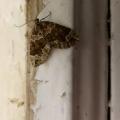
Devon Carpet - until recently a scarce species found mainly in the south of England and south Wales. Following a recent range expansion it is apparently now a fairly common inhabitant of Cumbrian woodlands and occasional visitor to hostel shower blocks.
August 2018.
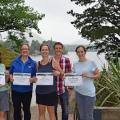
In July we received a jolly surprise in the post: a certifcate from the Theatre by the Lake in Keswick, announcing our place as top ambassador in the 11-20 bedroom category. That means that our guests have spent more at the theatre (taking advantage of the discount code) than those of any other establishment in the category. Long may this continue!
Our discount code is 20738, enabling you to claim a three pound discount on tickets, and you can either book online at www.theatrebythelake.com, in person at the box office, or by phone on 017687 74411.
We look forward to lots more theatre visits and hope you do too.
With the help of our new motion-activated night vision wildlife camera we’ve been able to see more of the wildlife in the hostel grounds, badgers in particular. We’re used to seeing red squirrels and deer, but nocturnal creatures are more elusive.
However, with the wildlife camera we’ve identified three badgers that walk the same tracks through the grounds, each at roughly the same time each night, squeezing through gaps in walls, hopping over streams, and visiting their latrine. Then they leave the grounds, apparently using the same exit point each night.
We would also like to record deer movements. They tend to stay on the fells during the summer, but as the winter draws in we see them cross the grounds, and a well-positioned camera may give us more information about their behaviour. We’d also love to see local owls in flight: we’ll keep you posted!
October 2018.

After such a fabulous summer, it’s hard to think about winter. However, we have a great winter discount available for early bookings, with beds and rooms available on most weekends and plenty of space over the New Year period.
This year we have a plentiful supply of seasoned firewood, all ready for cosy evenings by the fire. We hope you can join us.
Book before 31st October 2018 to stay with us during November, December, January and February and receive 40% off dormitory beds and private rooms, by using the promo code Winter18.
Bookings must be made online at www.derwentwater.org using the promotion code Winter18. There are a limited number of beds and rooms available each night, so this offer is not available for groups. However, group leaders can email reception@derwentwater.org or ring us on 017687 77246 to enquire about winter prices for group bookings.
October 2018.
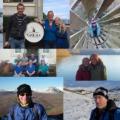
We expect to have one or two vacancies for seasonal live-in hostel assistants in 2019, starting in early March and working through to the end of October. If you, or any one you know, would be interested in joining us, please get in touch with me, Tim Butcher (Hostel Manager), at tim@derwentwater.org.
Please include your CV and let me know why you would be suitable to live and work in a hostel. We can then send out further information about the roles available.
October 2018.

No, not an article by our French staff member, but a beautiful moth, found by Alex in his moth trap. It truly was the wonder of the day. Alex placed it on a lichen-clad log, near the trap, so that you can see (just about!) the effective camouflage.
The scientific name Dichonia aprilina (Linnaeus, 1758) does not refer to the time of appearance, but to the colour of the wings, which resembles spring leaves. Dichonia means 'doubly', from the two whitish lines on the hindwing (Emmet, A.M., 1991. The Scientific Names of the British Lepidoptera - their history and meaning p.207).
October 2018.
We have two popular souvenirs for sale at the hostel: cuddly red squirrels and the ever-entertaining-and-inspiring Top Wainwright fell-bagging trumps game. Hopefully they'll commemorate enjoyable fell walks, and red squirrels seen in the grounds.
We also have the new 2019 Independent Hostel Guides in stock, and all the left-over 2018 guides going free! There are so many wonderful independent hostels throughout the UK, and the guide provides a page of information per hostel, in addition to location maps.
March 2019.
It's taken a while, but we are delighted to announce that the hydro-electric plant, which was damaged by Storm Desmond in December 2015, is fully functional again. In addition to the repairs, we had to update the scheme, to meet Environment Agency requirements, and there have been some improvements to the turbine technology. The turbine has been working really well so far, generating approximately 30% of our electricity.
The dam and intake were repaired over a year ago, but on trying to recommission the turbine we found that a lot of parts had seized up due to inactivity. So we took the decision to commission a major overhaul, carried out by Miles Postlethwaite of Border Hydro, which involved replacing many of the internal moving parts, all of which were re-engineered from scratch by Miles.
Now the hydro is generating up to 5 kilowatts in times of high flow, and still achieving 3 kilowatts in low flow conditions. If it continues at this rate we hope to generate 35,000 kwh in a year, which will be about 30% of the hostel’s electricity consumption: well worth the investment. You can read about the history of the hostel hydro-scheme here:http://www.derwentwater.org/ourhostel/groundsandwaterfall/hydroelectricplant
March 2019.
After thirteen years Nicola Leah has decided to leave the hostel to take up a job nearer home in Keswick, without the early starts and late finishes each day. We will all miss Nicola’s enthusiasm, and would like to thank her enormously for all her time and hard work. Her campaigning, and support for Dave and Kathy (former manager), were invaluable in securing the future of the hostel, helping to set up Derwentwater Independent Hostel after the sale by YHA in 2011. If a history of the hostel is ever written, there should definitely be a chapter dedicated to Nicola.
At the same time we welcome Matthew, who joins us on a permanent basis, and Jacqueline and Angela who are both with us for the season. We wish them all well.
May 2019.
A couple of colourful non-native species of wildfowl have been seen loitering by the lakeshore in the last month. One was a Red-breasted Goose that could be found trying to hide amongst the flock of feral Barnacle Geese that spend the summer here each year. The other is a splendid looking male Mandarin duck that seems to enjoy lazing around in Barrow Bay at the bottom of the hostel drive. The woods around the hostel are now alive with the songs of summer migrant birds including Chiffchaff, Willow Warbler, Blackcap, Garden Warbler, Wood Warbler, Redstart and Pied Flycatcher. The whimsical calls of Cuckoos can also now be heard in the surrounding area.
Speaking of Cuckoos, there are lots of beautiful Cuckooflowers (whose flowering is said to coincide with the arrival of the first Cuckoo) growing on the bank in front of the hostel. They're accompanied by a host of Yellow Pimpernel, Red Campion, Wavy Bittercress and various species of Speedwell (that I'm not really confident enough to name...) growing nearby. Bright blue cones of Bugle, honey-scented rods of Crosswort and elegant white flowers of Meadow Saxifrage, are starting to appear in the meadow ground at the bottom of the drive as well.
Orange Tips seem to have been the most numerous butterfly here so far this year but there are also a few Peacocks and the odd Speckled Wood flying around.
Finally, there have been a couple of very notable species of moth found in the hostel and grounds. The first of these was the nationally scarce Barred Tooth-striped, which was quite hard to spot against the bark of the tree it was resting on. But for people who prefer their insects huge and with pictures of eyes on their wings, the highlight of the last month has to be the female Emperor Moth discovered by Katy and Aukje in the hostel porch one morning. Apparently, once a virgin female Emperor Moth has found a place to settle she'll begin emitting pheromones which can attract a multitude of males (which are smaller and more brightly coloured than the female). Particularly large numbers of males can gather if she is held captive in a container that prevents them from reaching her and mating, as the magical love vapours will just keep pouring out of her. It's fortunate that Aukje quickly removed her from the porch, or the hostel might have been engulfed by a swarm of sex crazed man-moths.
May 2019.




